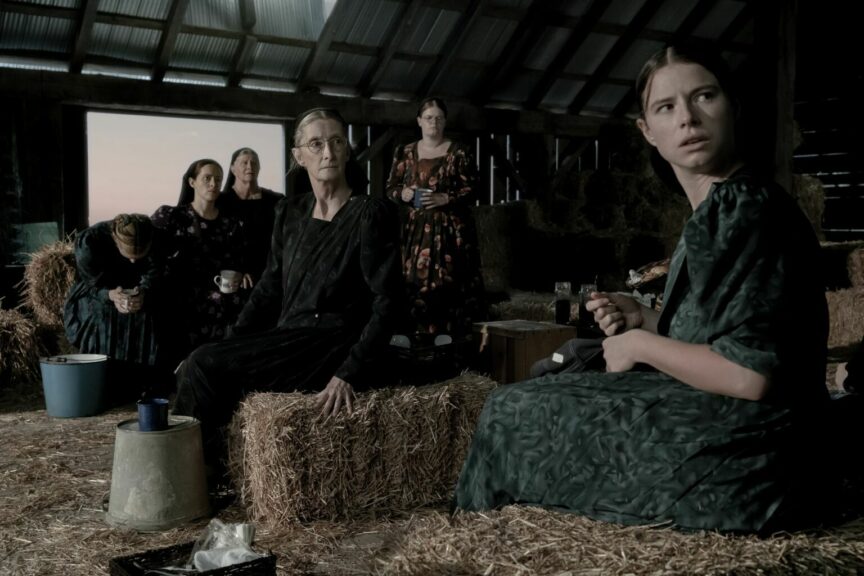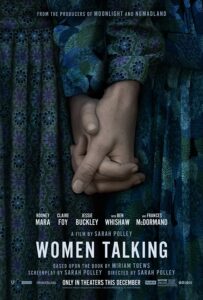Directed by Sarah Polley | Written by Polley, adapting the Miriam Toews novel | 104 min | ▲▲▲▲△ | Crave
A version of this review was posted on FITI during the 2022 Toronto International Film Festival.
With the splash Women Talking made at TIFF and AIFF, and the high profile of Sarah Polley on the awards tour that’s already begun, the film’s already had plenty of hype. It’s finally arrived here in cinemas, but I hope the level of buzz doesn’t raise expectations unreasonably. This is a small film, in some ways very literary and very Canadian. Its real strength lies in its perfectly chosen cast and screenwriting.
Polley’s first feature in a decade (since the wonderful Stories We Tell, a film that was my favourite in 2012) continues her interest in adapting Canlit classics from women authors as she’s done with Alice Munro in Away From Her and Margaret Atwood on the series, Alias Grace.
Women Talking is unread by me, so I can’t speak to fidelity to source, but what Polley’s done is tell a moving and politically engaging story about a group of women and girls in a religious community who meet in secret, in a hayloft, to decide what to do regarding the men. The women have learned they’ve been repeatedly raped by a group of men while drugged with bovine anesthetic. The men denied it and obfuscated about it before being arrested. The women have to decide what to do before the men get released on bail.
They discuss the options open to them: do nothing and live with the pain of it, fight for their rights within the community, or leave. The desperation is palpable. These men aren’t strangers, they’re brothers, fathers, and even husbands. These women haven’t been allowed an education, they don’t know how to read a map, so if they left they’d struggle to find their way in a world unlike what they know. But their faith in the system they live in has been, understandably, deeply shaken. To stay and do nothing feels unendurable, but fighting for their rights, their value in a deeply patriarchal community, also feels like an impossible challenge.
What works especially well is when Polley lets her actors — a stellar cast including Rooney Mara, Jessie Buckley, Claire Foy, Shiela McCarthy, Frances McDormand, and Ben Whishaw — just talk. Their core discussion never fails to engage, with unexpected humour in amongst the trauma mitigation.
It’s hard to choose a favourite among the performers — they each bring a different flavour to the conversation. Mara’s character is conciliatory and philosophical, Foy’s is full of rage, and Buckley, who is so good, is buried under layers of pain and bitterness.
It didn’t all work for me, and I say that with huge respect for what Polley has accomplished here. Parts of the film I found awkwardly paced, with scenes rushed or interrupted by flashbacks and a score that feels intrusive rather than complementary. Polley opens up the narrative to avoid visual inertia — it doesn’t feel like a filmed play in a single location — but that sometimes makes for an uneven tone. The use of “Daydream Believer” by the Monkees right in the middle of the movie is a particularly odd choice for a picture ostensibly set in the present day.
But also don’t be fooled — despite the heavy subject matter, Women Talking is remarkably hopeful. You might even be cheering at its end.














